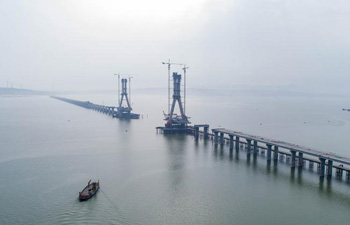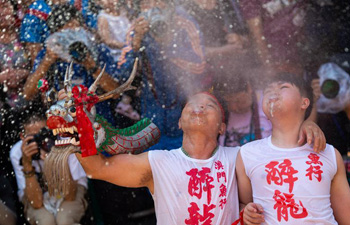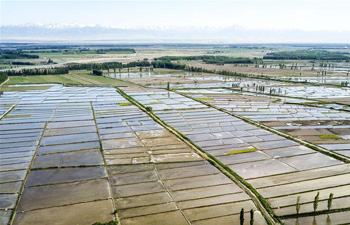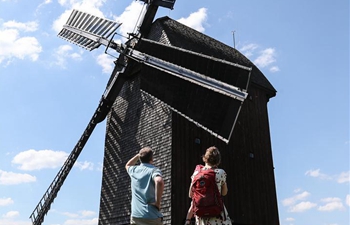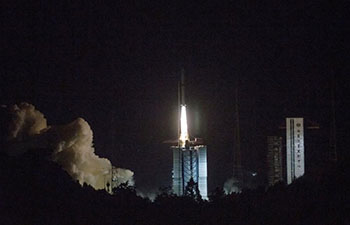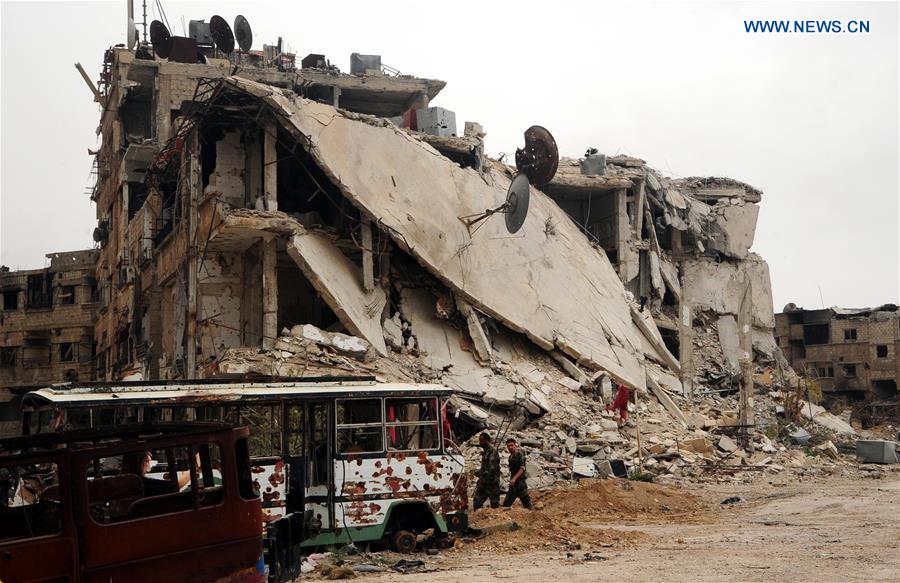
Syrian soldiers walk in the largely destroyed Hajar al-Aswad district, south of Damascus, Syria, on May 22, 2018, a day after it was declared free of the Islamic State (IS) militants. For the first time in seven years, Syria's capital Damascus was declared secure and empty of any rebel presence on Monday, following the defeat of the Islamic State (IS) in their last strongholds south of the capital, an achievement that closed the last chapter of the war in the Syrian capital. (Xinhua/Ammar Safarjalani)
DAMASCUS, May 22 (Xinhua) -- Islamic State (IS) militants resorted to suicide bombings at the last stage of Syrian Army's final battles to liberate IS strongholds in south of Syrian capital Damascus.
The battles in the districts of Hajar al-Aswad and the nearby Yarmouk Camp, as well as the pockets in the surroundings, were inevitable, as they were the last IS militant-held areas in southern Damascus.
"The militants entered Hajar al-Aswad in 2013 and remained there until 2018 when a decision was made to eliminate them from Hajar al-Aswad and the Yarmouk Camp as well as (parts of) Tadamun," a Syrian soldier told Xinhua.
The soldier, who asked not to be named under regulations, said that the campaign against IS advanced quickly in southern Damascus earlier this month, but it slowed down in the last stage as IS militants resorted to suicide bombings after losing arms supplies.
"We eventually succeeded in liberating these areas from the terrorists and the Syrian flag is raised," he said.
The fighter said the battles were difficult due to the urban nature of the Hajar al-Aswad and Yarmouk Camp areas.
"In some areas such as Tadamun, Yarmouk and Hajar al-Aswad, there is a density of buildings and there no roads are big enough for the military vehicles and tanks to storm through easily," he said.
He added that some of the buildings in the areas were linked with one another through underground tunnels which were booby-trapped by the IS militants.
A day following the Syrian military declared the liberation of the areas, Syrian law enforcement forces on Tuesday entered the formerly IS-held districts and raised the Syrian flags over the police stations there.
A police captain, who only wanted to be identified as a police officer, helped his comrades settling in at a largely destroyed police department in Hajar al-Aswad area.
He told Xinhua that even though the area is largely destroyed, but "it's our duty to be here and make sure the area is secure."
The Syrian army on Monday declared the capital Damascus safe and empty of rebels, making the entire capital safe for the first time in seven years.
This victory is regarded as a major achievement for the Syrian army and allied fighters.
In Hajar al-Aswad, military tanks and Syrian soldiers were seen on streets. In some ravaged corners, soldiers sat down for a rest or enjoy a cup of tea after the month-long battles in the area.
It is expected that the civilians who fled the war will return to their homes to check what could or could not be fixed.
The Yarmouk Camp was largely populated by Palestinian refugees, whose ancestors fled to Syria following the 1948 establishment of Israel, and was considered by Palestinians as the capital of their diaspora as it has a symbolic significance.
The people in the capital started breathing a sigh of relief after it is back under government's full control following military victories in the eastern and northern countryside over the past two months.




